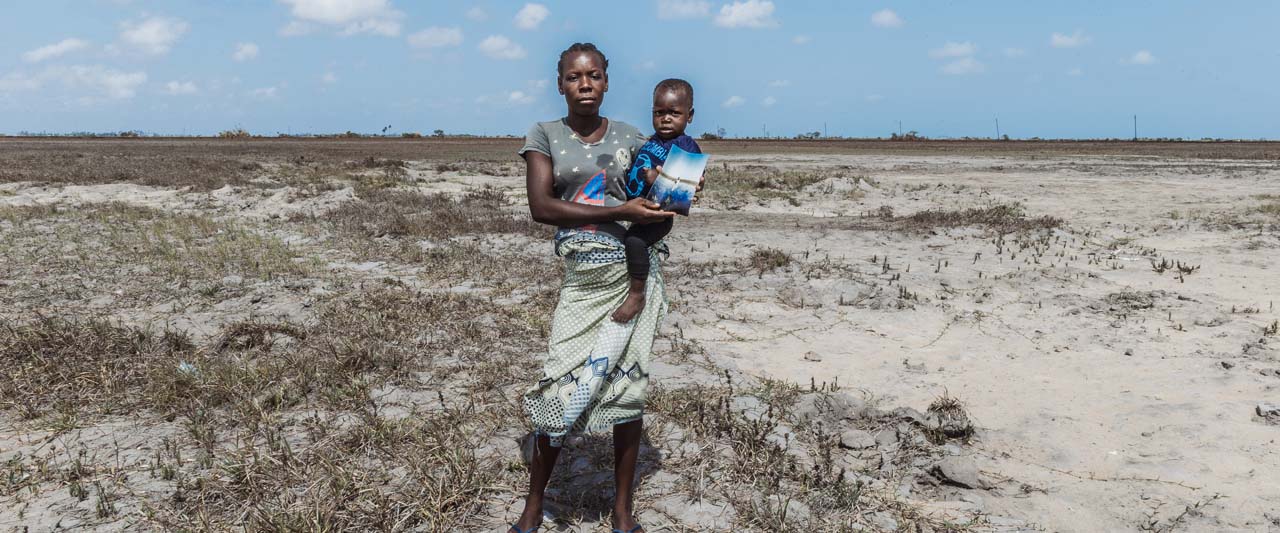In the coastal town of Joal in Senegal, the community are dependent on the sea for everything from their food to their livelihoods. But a reduction in rainfall, plus an influx of sea water and algae, caused by rising sea levels and erosion, means that many species of fish that used to flourish in the mangroves no longer do so.
Binetou Sonko, the president of the Baba Yaye Association, which farms local seafood, told an MSI Reproductive Choices outreach team: “It doesn’t rain much anymore, and everyone knows this is because of climate change. The saltiness of the sea has increased, and fish are becoming scarce.”
On the other side of the continent, 9,650km away in Beira, Mozambique, communities are also feeling the impact of climate change, with extreme weather events on the rise. After cyclone Idai destroyed her home in 2019, Laura Amandio struggled to rebuild and provide for her two children.
It is an injustice that women like Binetou and Laura, who have contributed the least to the climate crisis are suffering the most. While climate change threatens everyone, women and girls are disproportionately impacted, especially in the world’s poorest countries. Climate events, the effects of climate change and prolonged stress associated with these effects are damaging to women’s physical and mental health. Often in charge of food and water collection, when drought hits, women are forced to walk further making them more vulnerable to rape and subsequent unwanted pregnancy, and when harvests fail, they struggle to feed their families and can be forced to migrate.
Forced from their homes and their normal social structure, refugees and internally displaced persons are highly vulnerable, with one in five women and girls in humanitarian settings reporting experiencing sexual violence. Yet while the need for sexual and reproductive healthcare becomes more acute, access to quality care often falls.
At MSI and Ipas, what we are hearing loud and clear from women and girls in these vulnerable communities, is that they want access to sexual and reproductive healthcare, including contraception and abortion, to enable them to make their own reproductive health decisions while navigating the crisis. But the loss of their homes and their livelihoods very often means that access to abortion and contraceptive services is disrupted or non-existent.
New analysis from MSI across 26 climate-affected countries has found that since 2011, an estimated 11.5 million women have had their access to contraception disrupted due to climate-related displacement.
Unless contraceptive access is protected, MSI estimates that this will worsen and more than 14 million more women could lose access over the next decade, leading to an additional 6.2 million unintended pregnancies, 2.1 million unsafe abortions and 5,800 lives lost.
We know talking about reproductive rights in the context of the climate crisis is uncomfortable and we must be clear: sexual and reproductive healthcare should never be used to solve the climate crisis. But we need to listen to what women are telling us and support them with what they need to adapt to the cataclysmic changes happening around them.
At the same time, we must absolutely avoid painting a picture of women and girls as only victims of climate change and instead look to them as part of the solution: as educators, decision-makers and advocates. With reproductive choice, girls are better able to finish their education and pursue their careers, providing them with more economic stability and agency when facing a disaster. With reproductive autonomy, women are also better placed to take on decision-making roles at a community and national level, enabling them to have a seat at the table in finding climate solutions.
Around the COP26 climate conference, there is a focus on mobilising $100 billion per year to support low-income countries to respond to climate change. MSI Reproductive Choices and Ipas have joined 65 partners in calling on governments and donors to integrate sexual and reproductive healthcare and rights into these funding commitments, to support women and girls to adapt and become more resilient to the impacts they are facing today, from coastal erosion in Senegal to extreme weather in Mozambique.
For women like Laura and Binetou, who are living on the frontline of the climate crisis and tackling its impact, access to reproductive choice can support them to adapt to their changing environment and play a role in finding and advocating for solutions.
With contraception, Laura has been able to delay having another child until she can find more stable work while focusing on providing for the children she already has, while Binetou has been able to organise planting activities to restore and regrow the local mangroves, helping to protect the unique ecosystem against the impact of climate change and support improved seafood harvests.
Binetou told MSI’s outreach workers: “Choosing when to get pregnant makes life easier. Thanks to family planning, we can work and take care of the children. We can have four to five years without giving birth. That way we can support ourselves, look after our children and get on with everyday activities.
“This is why we use contraception, to reclaim our lives.”


